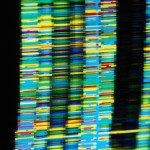Lien vers Pubmed [PMID] – 15701640
J. Biol. Chem. 2005 Apr;280(16):16088-95
Gene inactivation studies have suggested that the product of the retinoblastoma gene, Rb, is particularly limiting in pituitary pro-opiomelanocortin (POMC)-expressing cell lineages. Indeed, in Rb knock-out mice, these cells develop tumors with high frequency. To understand the implication of limiting Rb expression in these cells, we investigated the action of Rb and its related pocket proteins, p107 and p130, on POMC gene transcription. This led to the identification of the neurogenic basic helix-loop-helix transcription factor, NeuroD1, as a target of Rb action. Rb and to a lesser extent p107, but not p130, enhance NeuroD1-dependent transcription, and this activity appears to depend on direct protein interactions between the Rb pocket and the helix-loop-helix domain of NeuroD1. In vivo, NeuroD is found in a complex that includes Rb and also the orphan nuclear receptor NGFI-B, which mediates corticotropin-releasing hormone activation of POMC transcription. The formation of a similar complex in vitro requires the presence of Rb as a bridge between NeuroD and NGFI-B. In POMC-expressing AtT-20 cells, Rb and p107 are present on the POMC promoter and inhibition of their expression through small interfering RNA decreases POMC mRNA levels. The action of Rb and its related proteins on POMC transcription may contribute to the establishment and/or maintenance of the differentiation phenotype.
